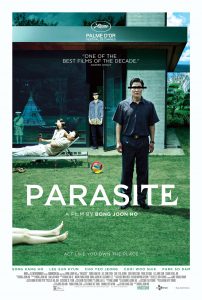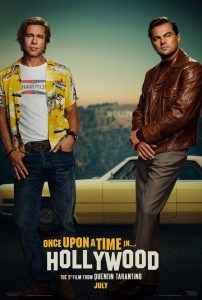With this year’s Academy Awards ceremony behind us, it’s time to take a look at how I did on my predictions for the winners in this annual competition, as first outlined in my previous blog, “Who Will Win This Year’s Oscars?”, first published on January 24. This was a mixed season for handicapping, some easy, some not. But I was generally pleased with the results, even when I was wrong in my predictions.
So how did I do? Four out of six correct calls, with two misses (and qualified ones at that). Here are the details:
Best Picture
The Field: “Ford v Ferrari,” “The Irishman,” “Jojo Rabbit,” “Joker,” “Little Women,” “Marriage Story,” “1917,” “Once Upon a Time…in Hollywood,” “Parasite” (“Gisaengchung”)
Projected Winner: “1917”
Actual Winner: “Parasite” (“Gisaengchung”)
Result: Missed call (sort of)
This has become the most difficult category to call in recent years, largely because it’s been hard to discern the mind of the Academy voters. What’s more, there were three films actively in the running for this award, based on the results from competitions leading up to the Oscars. Going in, “Parasite,” “1917” and “Once Upon a Time…in Hollywood” all had legitimate shots.
In my predictions blog, I called “1917” the winner for a variety of reasons, not the least of which were its wins in the contests sponsored by the Producers Guild of America and, post-blog, the Directors Guild of America, both of which are often strong predictors of the big prize at the Oscars. However, much to my surprise, on awards night, the statue went to “Parasite,” which seemed more like a dark horse than a shoo-in among the leading contenders.
Not that I’m disappointed with the choice; after all, “Parasite” was my favorite film of 2019. In the weeks leading up to the Oscars, I could see the picture gaining momentum, as evidenced by its win for best acting ensemble at the Screen Actors Guild Awards. But I didn’t think it would build up enough steam in time for the ceremony. Obviously I was wrong about that.
Support for this film ultimately proved to be so strong that it even overcame the projected split that I saw coming in the best picture and best director categories (see below). That’s impressive. What’s more, though, the selection of “Parasite” as best picture represents a significant breakthrough in Academy Award history. It’s the first foreign language film to win the best picture award. It’s also the first Korean film to win the award for best international feature film. That’s quite a number if obstacles to overcome, but it did it successfully – and deservingly so.
But, perhaps most importantly, this film’s win represents a broadening of horizons among Academy voters, a change from the “playing it safe” mindset that has dominated its thinking and choices so much in recent years. Let’s hope that voters keep that up in future years, that they’re more willing to think outside the box than they typically have. They’ve shown here that they can do it – if they so choose.
To my own credit, ahem, I did say that “Parasite” was the nominee that should win. So, given that this ended up being the case, I’ll gladly take a half-credit on this one (because I can!). Maybe I’ll get the mood of the voters right in future years.
Best Actor
The Field: Antonio Banderas, “Pain and Glory” (“Dolor y gloria”); Leonardo DiCaprio, “Once Upon a Time…in Hollywood”; Adam Driver, “Marriage Story”; Joaquin Phoenix, “Joker”; Jonathan Pryce, “The Two Popes”
Projected Winner: Joaquin Phoenix, “Joker”
Actual Winner: Joaquin Phoenix, “Joker.”
Result: Correct call
This was a no-brainer. Phoenix had won virtually everything leading up to the Oscars, and his only serious competition – Taron Egerton for “Rocketman” – wasn’t even nominated. Phoenix thus had a clear path open to him, and he made the most of it, taking home his first statue after four nominations.
Best Actress
The Field: Cynthia Erivo, “Harriett”; Scarlett Johansson, “Marriage Story”; Saoirse Ronan, “Little Women”; Charlize Theron, “Bombshell”; Renée Zellweger, “Judy”
Projected Winner: Renée Zellweger, “Judy”
Actual Winner: Renée Zellweger, “Judy”
Result: Correct call
This was another no-brainer, since Zellweger had been the front runner even before awards season began. She swept all of the major competitions and deservedly so. This was a good choice, the right performer for the right performance.
Best Supporting Actor
The Field: Tom Hanks, “A Beautiful Day in the Neighborhood”; Anthony Hopkins, “The Two Popes”; Al Pacino, “The Irishman”; Joe Pesci, “The Irishman”; Brad Pitt, “Once Upon a Time…in Hollywood”
Projected Winner: Brad Pitt, “Once Upon a Time…in Hollywood”
Actual Winner: Brad Pitt, “Once Upon a Time…in Hollywood”
Result: Correct call
Like the performances in the lead categories, this was another clear-cut winner, though it still boggles my mind how. Pitt swept all of the competitions throughout awards season, so there was no reason why the Oscars should have been any different. I still would have preferred another winner here (any of the other four would do, though Tom Hanks was my favorite), but sometimes the logic of Academy voters escapes me – as it clearly did here.
Best Supporting Actress
The Field: Kathy Bates, “Richard Jewell”; Laura Dern, “Marriage Story”; Scarlett Johansson, “Jojo Rabbit”; Florence Pugh, “Little Women”; Margot Robbie, “Bombshell”
Projected Winner: Laura Dern, “Marriage Story”
Actual Winner: Laura Dern, “Marriage Story”
Result: Correct call
Do we see a pattern here with the acting categories? This was another category that was not difficult to predict, given that Dern had won virtually every other competition (except the National Board of Review) leading up to the Oscars. Again, this award was hers to lose, and it was yet another example of the right performer winning for the right performance.
Best Director
The Field: Martin Scorsese, “The Irishman”; Todd Phillips, “Joker”; Sam Mendes, “1917”; Quentin Tarantino, “Once Upon a Time…in Hollywood”; Bong Joon Ho, “Parasite” (“Gisaengchung”)
Projected Winner: Quentin Tarantino, “Once Upon a Time…in Hollywood”
Actual Winner: Bong Joon Ho, “Parasite” (“Gisaengchung”)
Result: Missed call (sort of)
Like the basis of the 1948 erroneous newspaper headline “Dewey defeats Truman,” my prediction here (as with best picture) was based on outdated information. My prognostication of there being a split in the winners for best picture and director (with the spoils going to “1917” and “Once Upon a Time…in Hollywood,” respectively) was based on information from early on in awards season. However, as noted in my foregoing discussion about best picture, “Parasite” came on strong in recent weeks, not only in the top category but also for best director, enabling it to take both prizes and wiping out the split I projected.
Again, “Parasite” was my preferred choice in this category, despite the fact that I didn’t see it happening, so I’ll take another of those half credits I spoke about earlier.
Oscar® and Academy Award® are registered trademarks of the Academy of Motion Picture Arts & Sciences.
Reviews of some of the winners and nominees are available at the following links:
“1917”
“A Beautiful Day in the Neighborhood”
“Bombshell”
“Harriet”
“Jojo Rabbit”
“Joker”
“Judy”
“Marriage Story”
“Parasite”
“The Two Popes”
Copyright © 2020, by Brent Marchant. All rights reserved.
Monday, February 10, 2020
How’d I Do on This Year’s Oscars?
Subscribe to:
Post Comments (Atom)

No comments:
Post a Comment